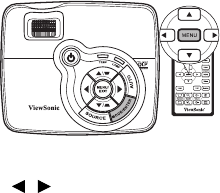
Operation 29
Optimizing the image
Selecting a picture mode
The projector is preset with several predefined
picture modes so that you can choose one to suit
your operating environment and input signal
picture type.
To select an operation mode that suits your need,
you can follow one of the following steps.
• Press MODE/ENTER on the projector or
Color Mode on the remote control repeatedly
until your desired mode is selected.
•Go to the PICTURE > Color Mode menu and press / to select a desired mode.
Picture modes for different types of signals
The picture modes available for different types of signals are listed below.
PC input signals: D-Sub / Comp. 1/2 (analog RGB)
1. Brightest mode: Maximizes the brightness of the projected image. This mode is
suitable for environments where extra-high brightness is required, such as using the
projector in well lit rooms.
2. Daylight mode: Is designed for presentations under daylight environment to match
PC and notebook coloring.
3. ViewMatch mode: Switch in between high brightness performance or Accuracy
color performance.
4. Cinema mode: Is appropriate for playing colorful movies, video clips from digital
cameras or DVs through the PC input for best viewing in a blackened (little light)
environment.
5. User 1/User 2 mode: Recalls the settings customized based on the current available
picture modes. See "Setting the User 1/User 2 mode" on page 30 for details.
Video input signals: S-Video, Video, D-Sub / Comp. 1/2 (YPbPr)
1. Brightest mode: Optimized for daylight viewing, with living room level ambient
brightness.
2. Gaming mode: Suitable for all types of entertainment media, including gaming and
movies.
3. ViewMatch mode: Switch in between high brightness performance or Accuracy color
performance.
4. Cinema mode: Is suitable for enjoying dark movies or DVD movies best viewed in a
blackened (little light) home cinema or lounge room environment.
5. User 1/User 2 mode: Recalls the settings customized based on the current available
picture modes. See "Setting the User 1/User 2 mode" on page 30 for details.
